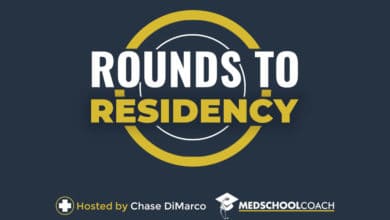Dr. Dana Corriel, a physician, entrepreneur, and founder of SoMeDocs, discusses the changing paradigms regarding social media in the medical field.
- [02:04] How Dr. Corriel Got Into Social Media Branding & Marketing
- [04:09] Dana’s Most Outrageous Experience as a Physician
- [08:05] General Social Media Guidelines for Students
- [12:18] Factfulness in Advocacy on Social Media
- [16:06] The Importance of Branding and Marketing
- [20:19] Choosing Social Media Platforms to Use
- [26:25] How to Find Out More About SoMeDocs
With social media playing such a big role in our lives, from politics to #MedBikini, it is important for medical students to consider the role of social media in their professional lives. Chase DiMarco talks to Dr. Dana Corriel, a physician, entrepreneur, and founder of SoMeDocs: Doctors On Social Media. We cover changing paradigms regarding social media in the medical field.
General Social Media Guidelines for Medical Students
Social media is a powerful tool of communication if leveraged in the right way. However, medical students should do this cautiously because we are steeped in cancel culture. This means that if a medical student says something unethical, everything that they say after that may be affected. Attendings have it a bit easier because they are already established. Just like magazines curate their content, medical students should curate the content that they post on social media to serve their personal and professional goals.
Factfulness in Advocacy on Social Media
In an attempt to advocate for a cause or to express thoughts important to them, people tend to share posts that they have not fact-checked, or that they have not fully thought about. Social media can become toxic when we are forced to share posts on a topic, unless we are willing to risk our reputations being smeared. We must not succumb to the pressure of the herd, and be willing to think through topics for ourselves. Individualized takes on issues are very valuable.
The Importance of Branding and Marketing
Often, people who do not prioritize fact-checking end up as the most popular influencers. This is because they might be excellent at branding and marketing. Dr. Corriel is passionate about enabling physicians and medical students— people who have the training to base their claims on facts and science — to in turn become excellent at branding and marketing. Whilst people do respect a medical degree, on social media, branding and marketing can hold more clout.
Choosing Social Media Platforms to Use
Different social media platforms — LinkedIn, Instagram, Facebook, and Twitter — can be suitable depending on a medical student or physician’s target audience, and what they themselves enjoy. For example, if a medical student or physician is excellent at making videos, YouTube can be a great option. If a medical student or physician is skilled at consistently writing short Twitter posts, and thrive in the often argumentative environment of Twitter, then they can choose Twitter! They should not choose a platform that increases their anxiety, or that they hate. If they are looking for some hand-holding to engage more in social media, then they should consider reaching out to Dr. Corriel , who takes guest moderators for the SoMeDocs Twitter chat every week, and provides lots of guidance.
Learn more about Dr. Corriel Corriel on her website and the SoMeDocs website. Check out her LinkedIn, Facebook, and Twitter profiles. Also, check out the SoMeDocs Facebook group. Be sure to check out SoMeDocs lecture series.
Sign up for a Free Coaching session with Chase DiMarco, sponsored by Prospective Doctor! You can also join the Med Mnemonist Mastermind FB Group today and learn more about study methods, memory techniques, and MORE! Do check out Read This Before Medical School. Like our FreeMedEd Facebook page and find our Medical Micro Course, Blog posts, and Podcasts at FreeMedEd.org! Feel free to Email any Questions or Comments.
